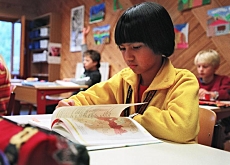
Division reigns over language teaching

A vote on Sunday in canton Schaffhausen to determine how languages other than German are taught in schools has thrust the focus on a burgeoning debate.
Recommendations from cantonal education heads that children start learning two further languages in primary school have met with opposition from some teachers.
Those against teaching pupils a second language in year three and another in year five say it will prove too difficult for many children and would overstretch teaching resources and budgets.
Opponents believe the introduction of a third language should be postponed until pupils reach the age of 13 or 14, when they are in secondary school.
Schaffhausen teacher and Social Democrat politician Daniel Fischer saw his political opposition to the so-called 3/5 model founder in the local parliament last year. But he found enough support to force a referendum on the issue this weekend.
He told swissinfo that the Swiss Conference of Cantonal Educational Directors, which put forward the recommendations in 2004, has not thought the idea through properly.
Fischer reckons that nearly two thirds of his pupils do not speak High German as a mother tongue, so they are already learning a foreign language when they start school. He argues that many would not cope with another two languages.
Extra funds
He also believes that the extra funds needed to help pupils who are struggling could cost the canton millions of francs.
“It is necessary to find a harmonised way of teaching foreign languages across Switzerland, but not with a bad system,” Fischer said. “The harmony that once existed across cantons has disappeared.”
Opposition to the 3/5 system also exists in cantons Zurich, Thurgau, Zug and Lucerne.
Canton Appenzell Inner Rhodes already defers teaching a second foreign language until year seven, but one school in Reute, Appenzell Outer Rhodes, operates a 3/5 system. Other cantons have yet to vote.
The cantonal education ministers’ conference is adamant, however, that two foreign languages should be taught in primary school to keep Switzerland competitive on the international job market.
“The 26 cantonal education ministers have found this common accord and also an agreement on the standards they will set for language learning. They all agree on the importance of early language learning in schools,” said spokeswoman Gabriela Fuchs.
Early exposure
Some scientists say that early exposure to languages helps children learn better.
Professor Cordula Nitsch, a neurologist from Basel University, told swissinfo that the language processing area of the brain is more effective in younger children.
“At the age of 10 to 12 years, children find it harder to gain access to this area of the brain dedicated to language learning,” she said. “This means children must learn languages in a more formulaic way.
“It becomes even harder to learn new languages during puberty with all its associated problems.”
swissinfo, Matthew Allen
The 26 cantonal education ministers agreed in 2004 to adopt a policy of teaching two other languages in primary school.
The policy stipulates that one should be English and the other a national language.
The ratification process for the accord is due to start at the end of 2007 and be complete by 2009.
In 2001, canton Appenzell Inner Rhodes became the first in Switzerland to teach English as a second language instead of French in year three. The move was greeted with scepticism from Swiss French speakers.
The results of a report into the initiative were published on Wednesday. Some 256 pupils who had studied English for four years were put through a series of reading, writing and grammar tests.
The tests revealed impressive results, with 76% of pupils able to read and understand long and complex texts.
Pupils said they enjoyed role-play and singing language lessons most of all.

In compliance with the JTI standards
More: SWI swissinfo.ch certified by the Journalism Trust Initiative
















![The four-metre-long painting "Sonntag der Bergbauern" [Sunday of the Mountain Farmers, 1923-24/26] had to be removed by a crane from the German Chancellery in Berlin for the exhibition in Bern.](https://www.swissinfo.ch/content/wp-content/uploads/sites/13/2025/12/01_Pressebild_KirchnerxKirchner.jpg?ver=bb19e376)















You can find an overview of ongoing debates with our journalists here . Please join us!
If you want to start a conversation about a topic raised in this article or want to report factual errors, email us at english@swissinfo.ch.